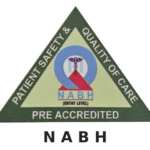Psycho-Oncology
“Together with you on your journey towards self healing.”
Psycho-oncology deals with the emotional, psychological, social and ethical aspects of cancer. Anxiety and depression are common with any cancer diagnosis, where patients and their loved ones feel overwhelmed with the onslaught of the disease and its profound influence on the emotional, psycho-social and economic well being of the family. Its emphasis is chiefly on the psychological aspects of how the disease manifests itself and the person’s attitude and the care giving support towards it.
It stresses on the psycho-social factors, like support from the cancer patient’s immediate environment that influence the disease’s process. From Diagnosis to the different Stages of the Therapy phase, psychological and social support is given to the cancer patient and their families.
Cancer Care Coordinator
Lake City Hospital has an in house support system where the CCC plays a multi-layered role of helping the patient and the family find the right kind of therapy plan, financial and social support services. The CCC also assists in educating the patient and the family about appropriate counseling and psychological therapy when needed.
Cancer Support Group
A cancer diagnosis can be overwhelming for the patient often provoking a strong emotional response of denial, a sense of loss and grief. Feelings of fear and anxiety riddled with existential crisis, depression and outright anger are often associated with it.
The failure to comprehend such strong feelings even by committed and supportive family members can push the patient into an abyss of loss and complete despair.
At Lake City Hospital, Support groups that comprise of cancer survivors and those undergoing therapy are encouraged to help reduce this emotional burden and stress. Group members are encouraged to vent out their anger and share their feelings by openly talking about things that they otherwise find difficult as this helps ease the burden they feel.
At Lake City Hospital Cancer Support Group meetings are facilitated by our Clinical neuro-psychologist.
Being a part of such a support group
- Gives patients the emotional catharsis they need to deal with the demands of the disease process.
- A sense of control over their existing condition by managing their emotions better.
- Gives them a chance of belonging by sharing what they truly feel.
- Apart from inspiring a sense of empathy among group members, cancer survivors also retrieve the lost meaning from their lives.
- Support group members also discuss the practical implications of their therapy process from what to expect during treatment, from managing pain to other treatment associated side effects.
Lakecity Hospital has endeavored to extend its psychological services to cancer survivors by introducing Psychotherapy Assisted Psychedelic therapy for those dealing with end stage cancer.
The Issue
In India, Nearly 1 million new cancer cases are diagnosed every year and up to 70-80% of them present with stage IV diagnosis where options of cancer directed treatment is very limited. It is estimated that at least 60%-80% of these patients need palliative and end of life care but at present only less than 5% of these patients have access to palliative and end of life care and less than 2 % of these patients have access to strong analgesics needed for pain relief.
End of life issues can be daunting for people who suffer from life-threatening cancer as they often face anxiety and depression related to death.
Existential and spiritual distress often overwhelms patients at the end stage and anti-depressants are not an answer to address such issues.
The Research
Through this research we are trying to elucidate why psychedelic research is important and the current revival necessary to pave the way for the future.
This will also allow us to see the efficacy of using ketamine as an adjunct to existential psychotherapy for patients with end of life issues.
The phenomenology of ketamine psychedelic psychotherapy (KPP) in the trans-personal context in dying patients has never been extensively explored,however a few case studies as a part of preliminary clinical observations on its effects on treating death anxiety has been observed.
Ketamine is known to induce distinct states of non-ordinary states of consciousness (NOSC), that contributes to a cathartic process and can bring rich insights from one’s life that are often revelatory in nature. We know that the phenomenon of the lived experience of a metaphorical death can be complex and very difficult for patients to face, since this would involve not only the death anxiety but also issues that were not once known or conscious to the person. One comes close to dealing with existential anxiety through ‘ego-death’ and ‘rebirth’ since the person experiences the dissolution of personal ego boundaries and experiences physical (body) and psychological (mind) death that are often life altering and can enhance personal awareness and self growth and harmonizes relations with loved ones and the world in general. By going beyond the personal life story such insights would in a way affirm one’s narrative of being able to make a decisive choice even in the final moments and come to terms with the transient nature of being in this world.
The Future
For both patients and physicians existential and spirituality issues are imperative elements of quality palliative care that demands urgent contemplation. Palliative care practitioners and those associated with the dying have begun to recognize this spiritual and existential emptiness that can overwhelm a person in the final days and are beginning to work on therapies that deal with this existential crisis.
This study will pave the way for future research in the following aspects:
In the context of imminent death, the psycho-integrator properties of ketamine along with the phenomenological exploration of one’s existential state of being will allow us to explore the potential efficacy of Ketamine Psychedelic Psychotherapy.
This will also allow us to see the efficacy of using ketamine as an adjunct to existential psychotherapy for patients with end of life issues.
Also, like anti-depressants ketamine does not require prolonged use, since it will only be used as an adjunct to psychotherapy that deals with existential crisis, limited sessions with it can have tiding effects over months with visible and life altering results experienced as patients begin to explore the dynamics of their own self-healing journey.


